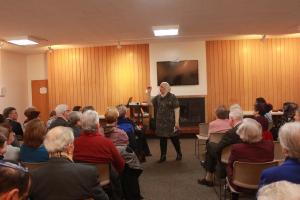Umd Professor Sahar Khamis Leads Interfaith Dialogue At Bethesda Church
January 31, 2016

Sahar Khamis led an interfaith talk to address facts and falsehoods about Islam.
By Gabriela Martínez
Sahar Khamis, a University of Maryland communication professor who specializes in Muslim media, held an interfaith talk at the Bradley Hills Presbyterian Church in Bethesda on Sunday to address facts and falsehoods about Islam.
She introduced the discussion to a crowd of about 50 with a short video titled "American Muslims: Facts vs. Fiction."
One of the most common misconceptions Khamis discussed was the immediate association between Islam and terrorism. According the statistics presented in the video, 6 percent of terrorist attacks committed on U.S. soil have been motivated by Islam.
"We need to address this issue of a skewed and distorted media stereotyping and misrepresentation," Khamis said. "We need to have counternarratives and alternative voices. We need alternative space so the moderate, sane, balanced, sensible voices are being heard on every side."
Khamis also emphasized the role of younger generations and their use of social media as a tool to promote these counternarratives. As an example, Khamis mentioned a knife attack in an East London Tube station back in December, in which the assailant yelled, "This is for Syria." After the man was hit with a stun gun and handcuffed, one of the bystanders at the scene called out, "You ain't no Muslim, bruv!"
The phrase spawned a widely used hashtag, #youaintnomuslimbruv, which is now used to denounce terrorism and challenge the link between Islam and terrorist attacks, she said.
Khamis teaches a course on Arab media, and she said that during the first lecture, she asks her students, "Is every Arab a Muslim or is every Muslim an Arab?" The answer, she said, is neither. This question is meant to address another common generalization about who is a Muslim, she said.
"There are some very big Muslim-majority countries that are not Arab countries. In fact, the largest Muslim country in the world is Indonesia," Khamis said.
Read more here.

